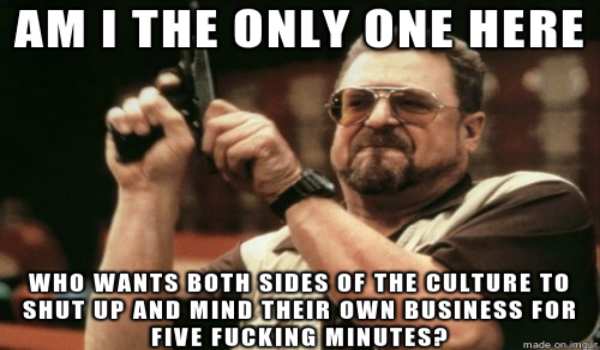Culture wars:for minorities, but still relevant
Point is: do you know WHY they are relevant?
Today the Guardian comments a report that found that 12% of the sampled UK voters accounted for 50% of all social media users. What does that really mean, or proves, in the UK and elsewhere?

<u><em><strong>CAPTION:</strong>
<a href="https://imgur.com/gallery/VG8bpcz" target="_blank">Source: Culture War Meme at imgur</a>
</em></u>
To see where I am going, have a look at these quotes from the article, deliberately edited to remove any explicit mention of the UK or other countries:
- The desire to fight a “culture war” is the preserve of a small group on the political extremes that does not represent most voters
- A disproportionate amount of political comment on social media is generated by small, politically driven groups
- 12% of voters accounted for 50% of all social-media and Twitter users - and are six times as active on social media as are other sections of the population
- There was actually widespread agreement over topics often considered “culture war issues”, such as gender equality and climate change
- The “tribes” most oriented towards politics… were least likely to agree with the need for compromise.
- Most voters balanced competing political concerns and ideas. For example, the polling found that:
- 73% believe hate speech is a problem, while 72% believe political correctness is an issue.
- Some 60% believe many are too sensitive about race, but 60% also recognise issues around “white privilege”.
The two most important findings
Yes, they may (or should, in a sane world) be obvious, like most of the points above. But here they are, the more we get in our skulls the better:
- Both sides of a culture war rely on exaggerating the threat of the other
- Both sides want us to think that every person who is “on the other side” to them has all these opposing views. The truth is many of these debates just pass most people by, because they are often based on creating false choices
Why culture wars are still relevant
I removed explicit mentions of UK or US because this is a very general issue. I am sure that the same pol in any other country would yeld very similar results, qualitatively.
But even if culture wars are actively fought only by tiny minorities of fanatics with nothing better to do, it does not mean that the rest of us could safely ignore them (whatever one’s opinion are!).
I want everybody to remind this, because:
- our digital world is made to order to insulate ANY extremist from reality. It’s made, that is, to make it harder for people to change their minds
- in general, it happens often that “entire populations submit to the preferences of a three or four percent of its intransigent members”
Culture wars can and sometimes must happen. But we ALL have, as a minimum, the responsibility to keep them anchored to reality, so to speak. That’s why I wrote this post. That poll described by the Guardian immediately reminded me of another post I wrote. To know more about the last two bullet points above, please read the REAL impact of fake news, echo chambers and filter bubbles.
Who writes this, why, and how to help
I am Marco Fioretti, tech writer and aspiring polymath doing human-digital research and popularization.
I do it because YOUR civil rights and the quality of YOUR life depend every year more on how software is used AROUND you.
To this end, I have already shared more than a million words on this blog, without any paywall or user tracking, and am sharing the next million through a newsletter, also without any paywall.
The more direct support I get, the more I can continue to inform for free parents, teachers, decision makers, and everybody else who should know more stuff like this. You can support me with paid subscriptions to my newsletter, donations via PayPal (mfioretti@nexaima.net) or LiberaPay, or in any of the other ways listed here.THANKS for your support!